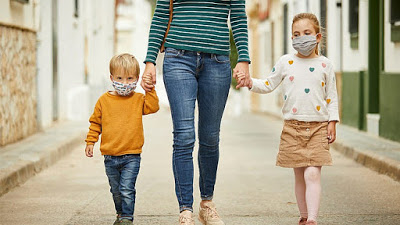
It’s no surprise to experts that the coronavirus has mutated, but it’s definitely worrisome. Here’s what parents need to know about the new COVID-19 variants.
Is it a virus’s destiny to mutate: They duplicate to spread and survive, genetic differences appear, and different versions—usually more infectious —take over. Since then, it’s continued to change, but those variations were mostly insignificant until the U.K. one appeared.
The overall infection rate among kids is still relatively low. But news of variants have raised questions – and concerns – for families.
What does B.1.1.7 mean for kids?
Brand new research from the medical journal The Lancet had encouraging results; researchers found that when kids catch the B.1.1.7 variant, it doesn’t result in a significantly different illness than the original strain—and we know that severe COVID-19 is rare in kids.
Children are also less likely to spread the current strain of the virus than adults are. Research from Public Health England found that the B.1.1.7. variant is about half as contagious in kids under 10 as it is in adults. (It fell somewhere in the middle for teenagers.) So kids are still less likely to spread it than grown-ups—but they will, like adults, spread it about 50 percent more quickly than our current version.
Other variants are also in play. “We have four major types that are being watched: the U.K., the South African, and two variants in Brazil,” says Chagla. The South African variant is here; it has been confirmed in 28 Canadian cases. Preliminary data suggests it might also be about 50 percent more contagious than our current strain, and that vaccines might be less effective against it—though they are expected to still offer significant protection.
How can we stay safe?
“The variant hasn’t changed the way these diseases circulate—they’re still transmitted primarily by droplets and aerosol transmission in close contact,” says Chagla. So the steps we should take to protect ourselves are the same: social distance, wear a mask, stay in your bubble, and wash your hands thoroughly and frequently. The fact that the new variant is more contagious means there’s less room for error we need to take the same precautions, but make sure that they’re followed to a T.
And it doesn’t mean it’s hopeless, says Otto. “We’ve done a great job in Canada of bending the curve again and again. [If B.1.1.7. takes over] this is going to be a harder curve to bend down, but it’s still bendable—we just have to push 50 percent harder.”
What about kids health?
While there’s been a rise in the number of kids diagnosed with COVID-19, the good news is that, in general, children do not become seriously ill from COVID-19. Most kids who become infected will experience only mild symptoms.
If you think your child might be sick, or if they’re diagnosed with COVID-19, stay in contact with their doctor. Be on the lookout for symptoms of MIS-C, a rare but very serious inflammatory disease that’s related to COVID-19.
Otherwise, keep wearing masks, social distancing, practicing great hand hygiene, and making safe choices. As we get through the second wave and work to vaccinate our community, these continued efforts will keep our kids – and each other – safe from COVID-19.
Source: https://bit.ly/3dY16dj & https://bit.ly/2PnildH
Daycare in Vaughan